Congressional Focus Remains on Highway & Transit Bill
July 13th, 2015 | By: America's Infrastructure Report Card
This week both the U.S. House of Representatives and U.S. Senate will gear-up over the future of federal highway and transit funding and policy. The House is expected to approve a six-month extension of current policy, which would cost approximately $9 billion. The Senate is expected to take-up highway legislation later this week, but it remains unclear to length and scope of legislation that they will be pursuing. Majority Leader McConnell has expressed support for a multi-year bill, possibly some form of the DRIVE Act. However, other Senators have discussed the option of extending the current policy to the end of the year with the hopes of dedicated revenues to transportation from international tax reform. The Senate Commerce, Science and Transportation Committee is set to mark-up its safety, freight and rail portions of the bill this Wednesday morning. It remains unclear when or if the Senate Banking Committee will mark-up its transit portion of the bill. Last week, Congressman Tom Rice (R-7-SC) introduced the H.R. 2971, “The Highway Trust Fund Certainty Act”, which would raise federal motor fuels taxes by approximately 10 cents per gallon and index that rate to inflation in order to address the current annual Highway Trust Fund shortfall. In a letter to the Congressman, ASCE commended Rep. Rice’s leadership on this issue, but noted that additional federal investment will still be required to meet our nation’s long-term surface transportation infrastructure needs. You can urge Congress to #FixTheTrustFund by the July 31 legislative deadline in the following ways:- Send a request today to meet with your members of Congress: Here are some helpful hints and how to set up a “back home” meeting.
- Contact your Member of Congress via letter or phone call: If you can’t meet in person, send your member of Congress a quick letter about the Highway Trust Fund or give their office a call and ask for the staff that handles transportation. Look up their number and get talking points here.
- Communicate with your member of Congress via social media: Most members of Congress have Facebook and Twitter pages. In addition to calling or writing a letter, urge them to #FixTheTrustFund on social media.
#FixTheTrustFund This Week: Keeping the U.S. from Driving into Potholes
June 22nd, 2015 | By: America's Infrastructure Report Card
The Highway Trust Fund (HTF) was set up in 1956 to fund the build and maintain a transportation network nationwide. Today, it is the national bank account for roads, bridges and transit that reimburses states for eligible projects. Inaction by Congress has put the Highway Trust Fund in jeopardy, and with a month left before the temporary funding fix runs out on July 31st, Congress is nowhere near to closing a deal to generate sustainable revenue for the nation’s highway, bridge, and transit systems – investments vital to the health of our recovering economy. #FixTheTrustFund is a call to action to solve this transportation problem today. This week Congress is slated to step up hearings on transportation. Here’s what we’ll be watching in national campaign to #FixTheTrustFund this week: June 23, 10 a.m.: Senate Transportation, Housing and Urban Development, and Related Agencies Appropriations Subcommittee markup of a fiscal 2016 transportation spending measure. (Listen live) June 24, 9:30 a.m.: Senate Environment and Public Works Committee to mark up the Developing a Reliable and Innovative Vision for the Economy, or DRIVE, Act. (Info) What to watch for: With the current strong bipartisan consensus, we expect the mark-up to go smoothly. That action will put pressure on the other authorizing committees and the Senate Finance Committee to secure their pieces of the bill before the July 31 legislative deadline. The Senate the Finance Committee will hold a hearing on private sector investment and public-private partnerships with the former Indiana governor Mitch Daniels and current Colorado DOT chief Shailen Bhatt. Ranking Member Ron Wyden (D-OR) is expected to highlight his new bipartisan bill that would expand tax-exempt private activity bonds and create a new federal infrastructure tax credit. June 24, 2 p.m.: House Ways and Means Subcommittee on Select Revenue Measures hearing on the “taxation of the repatriation of foreign earnings as a funding mechanism for a multiyear highway bill.” (Info) What to watch: Across the Capitol in the U.S. House of Representatives, the Ways and Means Subcommittee on Select Revenue Measures will hold a hearing on the prospect of taxing U.S. corporate foreign earnings – otherwise known as repatriation – for deposit in the HTF, which the Obama Administration supports. This funding fix does not have unanimous support on either the Republican or Democratic side of the aisle, so expect some internal party disagreements on this as a solution along with some opposition from large, multinational corporations who will be on the hook to pay the tax. June 24, 2 p.m.: House Transportation and Infrastructure Highways and Transit Subcommittee hearing on “Meeting the Transportation Needs of Rural America.” (Watch live) June 25, 10 a.m.: Senate Finance Committee hearing on exploring ways that private financing could back infrastructure projects. (Info) Help Us #FixTheTrustFund 1. Tell Congress that it’s time to fix the Highway Trust Fund and increase our investment into transportation before the July deadline. 2. If you’re in MD, OR, CO, TX or WI, attend a Town Hall Meeting this week and ask your Member of Congress about their ideas on how to fix the Highway Trust Fund.| 6/24/2015 | Rep. Harris (R-MD-1) | This meeting is conducted by telephone.For more information on this meeting, follow this link: vekeo.com/event/congressman-andy-harris-06242015/?awesm=vekeo.buzz_t1u/ | Starts at 6:45 pm |
| 6/27/2015 | Sen. Wyden (D-OR) | Hood River Valley Adult Center2010 Sterling Dr.Hood River, OR 97031 | Starts at 1:00 pm |
| 6/27/2015 | Rep. Perlmutter (D-CO-7) | Natural Grocers by Vitamin Cottage4900 Kipling St.Wheat Ridge, CO 80033 | Starts at 10:00 am |
| 6/27/2015 | Rep. Sessions (R-TX-32) | Richland CollegeGarland Campus675 West Walnut StreetGarland, TX 75040-5023This meeting requires an RSVP. Register online.For more information on this meeting, follow this link: sessions.house.gov/index.cfm/june-town-hall | Starts at 11:00 am |
| 06/28/2015 | Rep. Sensenbrenner (R-WI-5th ) | Brookfield Public Safety Building 2100 North Calhoun Road Brookfield, WI 53005For more information on this meeting, follow this link: sensenbrenner.house.gov/contact/ | Starts at 7:00 pm |
Senator’s 2020 Vision For America’s Infrastructure
January 27th, 2015 | By: Becky Moylan
Aging infrastructure, graded at a D+ national GPA, is no secret. In fact, it is the news each and every day. From a water main break that hindered a morning commute in DC, to the potholes that inhibit safe driving, Americans across the country are experiencing inconveniences and challenges because of deficient roads, bridges, water pipes and other infrastructure. Furthermore, we have an investment shortfall across our major infrastructure sectors of just over $200 billion a year. Underinvesting in these vital systems costs us more in the long run. Today, Sen. Sanders shared his bill as a vision to better fund infrastructure and address the backlog of needs. As the new ranking member of the Senate Budget Committee, Sen. Sanders is taking the opportunity to introduce a $1 trillion, five-year plan for the nation’s infrastructure. The measure would inject an additional $75 billion a year into the Highway Trust Fund, create a national infrastructure bank and expand financing and grant programs. Additionally, it would fund freight and passenger rail improvements, airports, water projects, ports and inland waterways and national parks, along with broadband and electric networks. ASCE’s Casey Dinges joined the Senator from Vermont to share our vision of what needs to happen to improve our nation’s infrastructure. During his remarks, Casey said “By taking steps to invest in our nation’s infrastructure, the U.S. can protect $3.1 trillion in GDP, $1.1 trillion in U.S. trade value and 3.5 million jobs and a little over $3,000 a year per family. Without these investments, infrastructure – the backbone of our nation’s economy – will continue to decline and Americans will pay the price.” With the need to #FixTheTrustFund looming ahead, this bill is a positive step in the conversation and a good reminder that inaction is not an option.Tags: #fixthetrustfund, aviation, bridges, report card, roads, transportation
3 Comments »
5 Graphics Every Pennsylvania Driver Should See
July 17th, 2014 | By: Infrastructure Report Card
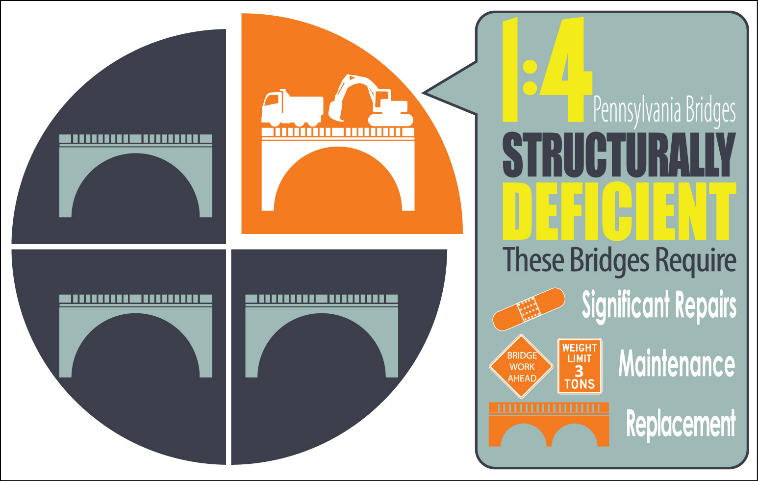
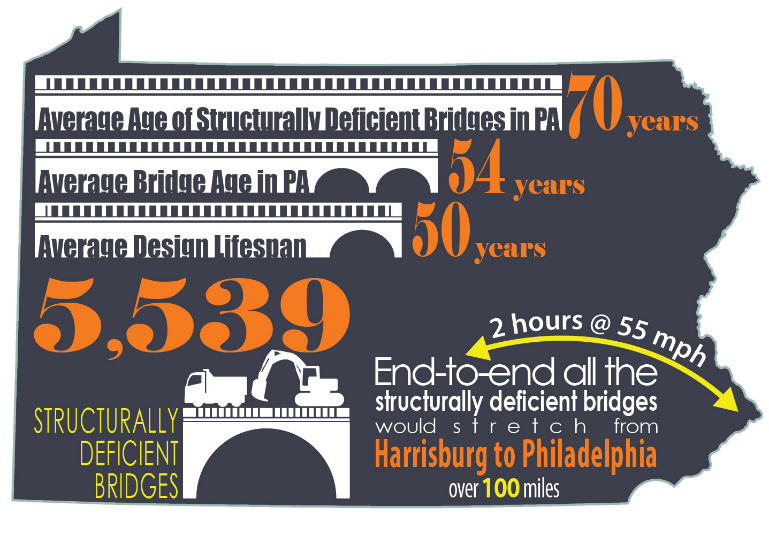
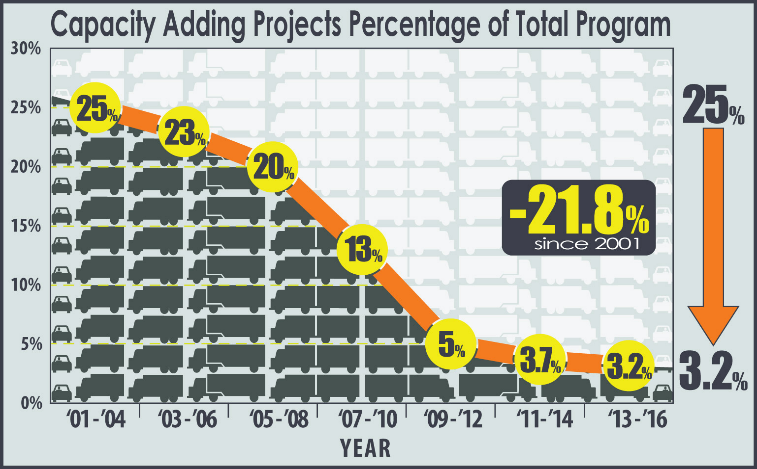
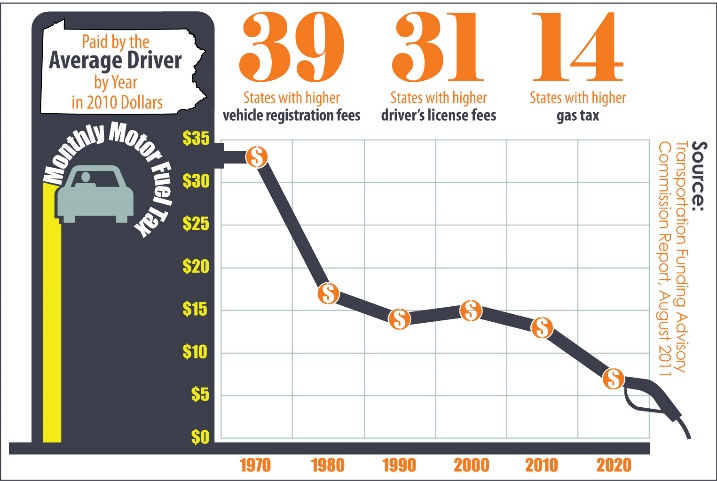
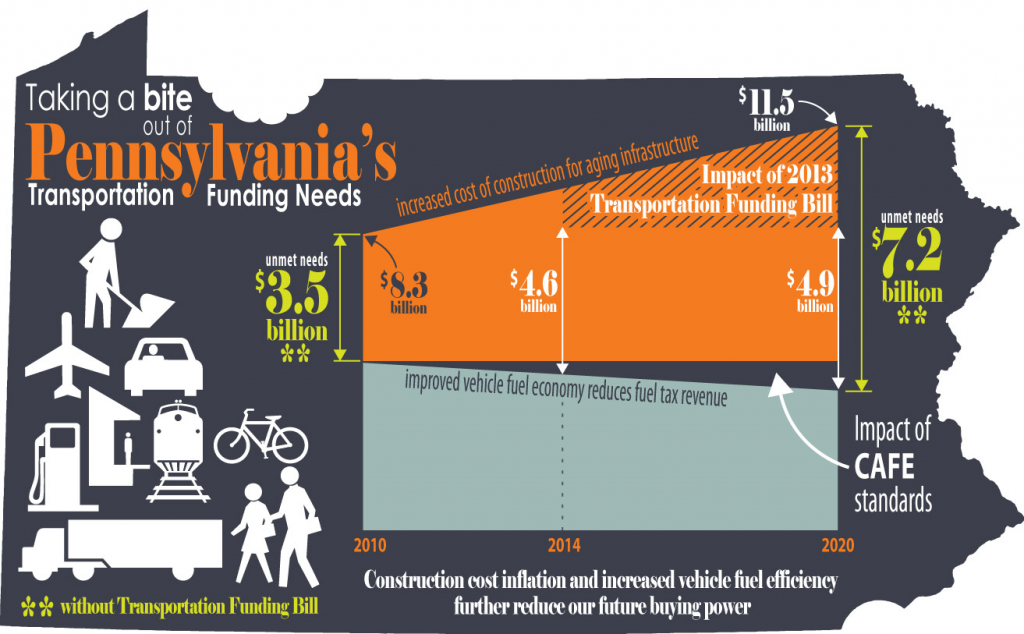 In 2013, Pennsylvania stepped up to start addressing these problems with a transportation funding package, but even with it, there’s still more work to be done than the funding that’s available. Also, if Congress fails to come up with their promised funding by the end of August, this could set Pennsylvania back in spite of trying to catch up on their transportation needs. Pennsylvania has done their part, Congress should really get to work on theirs.
Want to find out more about Pennsylvania’s other infrastructure? Start with the 2014 Report Card for Pennsylvania’s Infrastructure!
Images created by Jason Forbes of McCormick Taylor
In 2013, Pennsylvania stepped up to start addressing these problems with a transportation funding package, but even with it, there’s still more work to be done than the funding that’s available. Also, if Congress fails to come up with their promised funding by the end of August, this could set Pennsylvania back in spite of trying to catch up on their transportation needs. Pennsylvania has done their part, Congress should really get to work on theirs.
Want to find out more about Pennsylvania’s other infrastructure? Start with the 2014 Report Card for Pennsylvania’s Infrastructure!
Images created by Jason Forbes of McCormick Taylor
Tags: #fixthetrustfund, bridges, congress, Pennsylvania, report card
No Comments »
New Congressional Proposal Offers Gas Tax Increase Tied to Inflation
June 18th, 2014 | By: America's Infrastructure Report Card
We saw some encouraging movement from the Hill today on transportation. Senators Bob Corker (R-TN) and Chris Murphy (D-CT) are floating a plan to increase the gas tax twice by increments of six cents, and then index the gas tax to inflation so it’s a sustainable revenue source. Here’s a statement from ASCE President Randall Over, P.E. : “The proposal issued today by Sens. Murphy and Corker to increase the federal gas tax as a way to provide needed long-term funding for the Highway Trust Fund is an encouraging step to improve our economy and raise the grades on the nation’s surface transportation infrastructure. “With the Highway Trust Fund expected to become insolvent in a matter of months, now is the time for action. The nation’s surface transportation challenges are too vast and the costs are too great for us to continue with the status-quo. “We applaud the bold leadership exhibited by Sens. Murphy and Corker for offering a meaningful proposal to help solve this problem, and look forward to working with them as this plan moves through the Senate.” To learn how you can get involved to fix the Highway Trust Fund visit ASCE’s new website FixtheTrustFund.org.Tags: #fixthetrustfund, Corker, gas tax, Murphy, statement, transportation
No Comments »
What Happens To States When the Highway Trust Fund Runs Dry? Florida Weighs In
May 18th, 2014 | By: Infrastructure Report Card
Depletion of the Federal Highway Trust Fund- What Could it Mean for Florida? An Exclusive Interview with FDOT State Secretary Prasad by Steve Lubinski, PE, CWI, LEED-AP Miami-Dade ASCE conducted an exclusive interview on May 6, 2014 with Florida’s Secretary of Transportation and head of FDOT, Ananth Prasad. The Federal Highway Trust Fund (funded by the Federal Gas Tax) provides 30% of Florida Department of Transportation’s funding, but the fund is in danger of becoming insolvent in 3 months or less according to the Congressional Budget Office estimates. Capitol Hill gridlock could make insolvency a reality if they don’t act (as shown in the chart below from USDOT).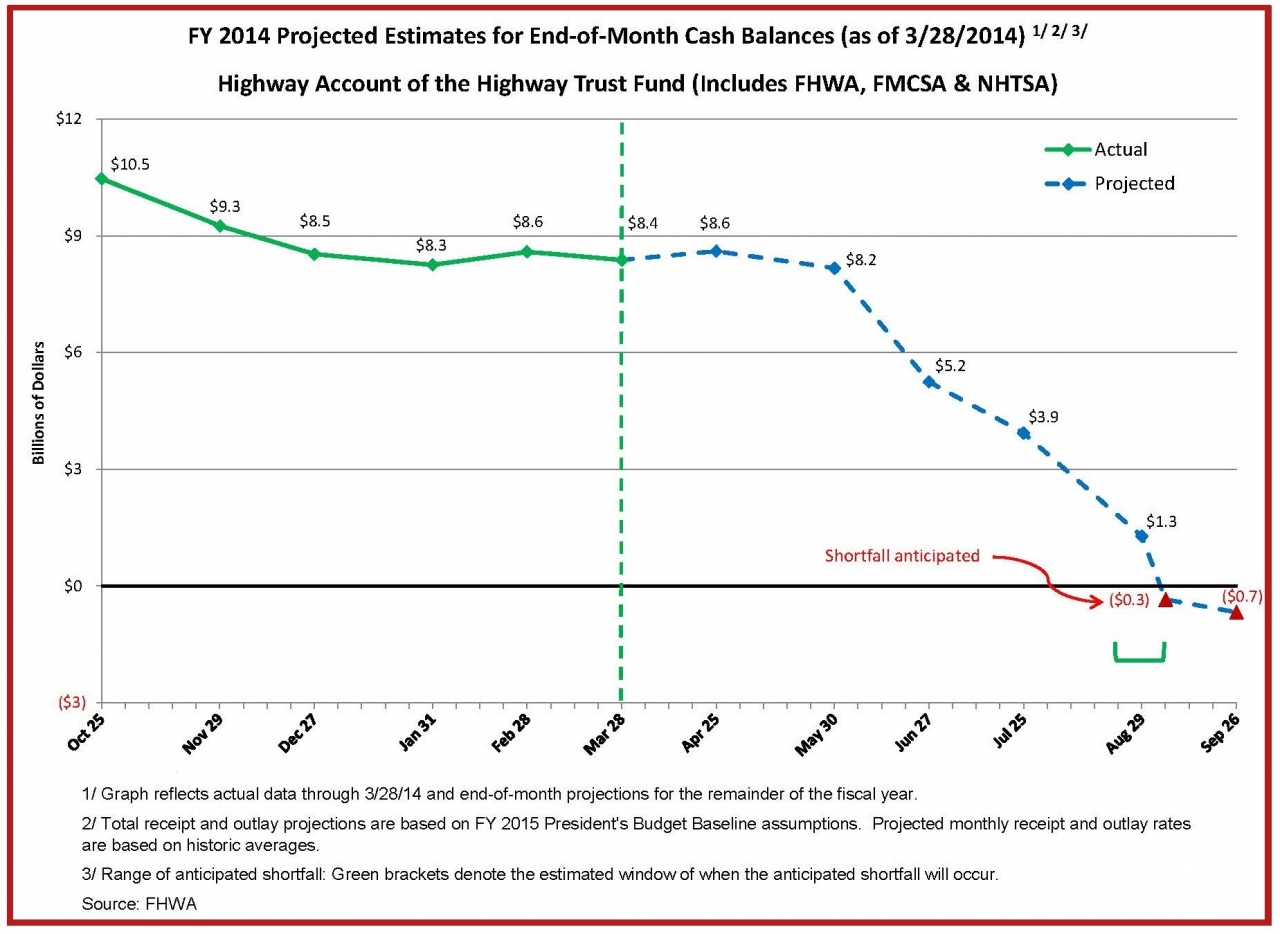 MD-ASCE: Miami-Dade ASCE thanks you for this opportunity. Can you discuss the magnitude of the problem with the Federal Highway Trust Fund?
AP: As you know it’s a problem. The Federal Highway Trust Fund will run out of money in July or August, so Congress will have to find a way to keep it solvent and come up with around $9 Billion. But then the bigger picture going forward is that the receipts coming into the Federal Highway Trust Fund are actually less than the outlays are for project commitments. With all of the projects from state Departments of Transportation the current shortfall would be around $15 Billion next year. First Congress will have to get $9 Billion for the Federal Highway Trust Fund to be solvent for the remainder of this federal fiscal year, and then going beyond, we need to either extend MAP 21 at the current funding level plus add an additional infusion of $15 Billion+ until a more permanent solution is arrived at by having higher revenues to support the program or reduce the program to the level of the revenue.
MD-ASCE: A big reason why the Highway Trust Fund revenues are not keeping pace with our needs is that cars have become much more efficient than 20 years ago. Are there other causes?
AP: Yes. The other issue is that the Federal Highway Gas Tax has not been raised since 1993 or indexed to inflation. When you look at the cars you drove in the mid 1990s, the car that you drive today is more fuel efficient. Also, what a dollar could buy in 1993 is not what a dollar can buy in 2014. So you have two things going against you, the first thing is the purchasing power of the gas tax which hasn’t changed since 1993 (inflation), and the second is your fuel efficiency. Hence we have this crisis that is getting more acute lately because of better fuel efficiency standards.
MD-ASCE: Has FDOT received any correspondence from USDOT about the possible insolvency?
AP: No. However, USDOT Secretary Foxx has made some comments in general briefings with us during federal highway and USDOT national meetings, but no formal correspondence sent out, nor any correspondence about the possibility of slowing down reimbursements to the states. With this federal program, we have to spend money, then seek reimbursement from them (USDOT).
MD-ASCE: Has FDOT begun working on any contingency plans on what to do if the Federal Highway Trust Fund does become insolvent in July or August?
AP: Our contingency plan is that we are only dependent on federal funds to the tune of about 30% of our programs. So, unlike other states as shown in a newspaper article, we are one of the few states that do not have to rely as heavily on federal funds. So what we’ve been doing is carrying a higher balance in our trust fund so that if we don’t get reimbursed (by the federal government) timely, then we can still continue to pay our bills to contractors. I would say that since Florida only relies on the federal government for 30%, and Florida revenues are a little robust, so we carry a higher balance in our Florida trust fund. I think we could survive an insolvent Federal Highway Trust Fund for 3-6 months without any negative impact, but beyond that you’re going to have a tangible impact that you can’t avoid.
MD-ASCE: What do you think will happen in Washington D.C. after July or August?
AP: Beyond July or August there is a big election coming up nationally so I’m cautiously optimistic that they will put more money in to make the fund solvent until next year, then after the fall elections are done the Congress would likely begin debating a much more robust highway bill and how to fund it. Policy frameworks are easy, but the bigger issue is how do you get funding?
MD-ASCE: Has FDOT made any plans for projects that would be protected if the Federal Highway Fund does become insolvent?
AP: Safety and preservation is first. The second thing would be public-private partnership projects. Those have to be protected. So we’ll walk through the list. We have a game plan for doing this. Obviously safety and preservation, then public-private partnerships, then we’ll start looking at projects that could be deferred and projects that are based on other things that are happening in a region that we don’t want to negatively affect.
MD-ASCE: In South Florida we have many big projects planned during this timeframe like the 826-836 interchange, managed lanes for Palmetto and I-75, I-95 Express phase 2.
AP: 826-836 would be one of the last things affected since it is a project already under construction.
MD-ASCE: And the other examples?
AP: The reality is that is that for projects like the express lanes on the Palmetto and I-75 where construction has not begun, we may have to delay the project a few months. But we would not delay an ongoing project of that magnitude like 826-836. We would look at projects that are about to start and maybe push out the start date a little bit, and not take on new projects until the situation stabilizes. Ongoing construction projects…. I don’t foresee that they would be impacted.
MD-ASCE: The USDOT site has a sub-account listed for mass transit, which projected it to remain solvent only until late 2014. How might mass transit be affected?
AP: We would have to look at prioritizing critical services, not taking on new things, and maybe scale back on some things. It’s like if tomorrow someone said you now need to live off only 70% of your income, then you’d have to make some choices. For the next 3 months you need to live off 70% of your income, you’d prioritize, you defer some things.
MD-ASCE: What are some things the public might notice if the federal transit account becomes insolvent?
AP: I’m sure the service levels would be affected. If you don’t have the money, you can’t run the same services….frequency of buses or trains, so you’d see diminished or less frequent service that you’d have to work around. Hopefully they will fix the shortfall. I think right now there is more of a focus (in Washington) on a short-term fix. I don’t believe there is enough support for increasing the gas tax, so the folks in D.C. they may have to look at other options of maybe cutting things that aren’t as relevant in the 21st century.
MD-ASCE: What are some other things you think Floridians should know?
AP: We need to continue investing in infrastructure. At the state level we are doing it. At the federal level their role should be proportionate with the amount of funding they provide. We need to deliver projects in a more cost-efficient way, while making sure we balance it within model impacts, historical impacts, social impacts, and economic considerations. All those things need to be balanced. If we do that, we can deliver projects in the most cost-efficient way.
MD-ASCE: What is your take on the last legislative session in Tallahassee?
AP: Our budget is robust. The legislative session just ended and the legislature just passed the budget to fund the transportation at record levels, which obviously the Governor has been very supportive of….our investment in ports, aviation, and transportation. Investments in transportation are the foundation for economic development and activity. If we are looking to attract businesses to come to the state and wanting businesses in the state to grow, they are going to ask: what’s our quality of life, quality of education, and quality of infrastructure.
Read the full interview here in their May newsletter.
MD-ASCE: Miami-Dade ASCE thanks you for this opportunity. Can you discuss the magnitude of the problem with the Federal Highway Trust Fund?
AP: As you know it’s a problem. The Federal Highway Trust Fund will run out of money in July or August, so Congress will have to find a way to keep it solvent and come up with around $9 Billion. But then the bigger picture going forward is that the receipts coming into the Federal Highway Trust Fund are actually less than the outlays are for project commitments. With all of the projects from state Departments of Transportation the current shortfall would be around $15 Billion next year. First Congress will have to get $9 Billion for the Federal Highway Trust Fund to be solvent for the remainder of this federal fiscal year, and then going beyond, we need to either extend MAP 21 at the current funding level plus add an additional infusion of $15 Billion+ until a more permanent solution is arrived at by having higher revenues to support the program or reduce the program to the level of the revenue.
MD-ASCE: A big reason why the Highway Trust Fund revenues are not keeping pace with our needs is that cars have become much more efficient than 20 years ago. Are there other causes?
AP: Yes. The other issue is that the Federal Highway Gas Tax has not been raised since 1993 or indexed to inflation. When you look at the cars you drove in the mid 1990s, the car that you drive today is more fuel efficient. Also, what a dollar could buy in 1993 is not what a dollar can buy in 2014. So you have two things going against you, the first thing is the purchasing power of the gas tax which hasn’t changed since 1993 (inflation), and the second is your fuel efficiency. Hence we have this crisis that is getting more acute lately because of better fuel efficiency standards.
MD-ASCE: Has FDOT received any correspondence from USDOT about the possible insolvency?
AP: No. However, USDOT Secretary Foxx has made some comments in general briefings with us during federal highway and USDOT national meetings, but no formal correspondence sent out, nor any correspondence about the possibility of slowing down reimbursements to the states. With this federal program, we have to spend money, then seek reimbursement from them (USDOT).
MD-ASCE: Has FDOT begun working on any contingency plans on what to do if the Federal Highway Trust Fund does become insolvent in July or August?
AP: Our contingency plan is that we are only dependent on federal funds to the tune of about 30% of our programs. So, unlike other states as shown in a newspaper article, we are one of the few states that do not have to rely as heavily on federal funds. So what we’ve been doing is carrying a higher balance in our trust fund so that if we don’t get reimbursed (by the federal government) timely, then we can still continue to pay our bills to contractors. I would say that since Florida only relies on the federal government for 30%, and Florida revenues are a little robust, so we carry a higher balance in our Florida trust fund. I think we could survive an insolvent Federal Highway Trust Fund for 3-6 months without any negative impact, but beyond that you’re going to have a tangible impact that you can’t avoid.
MD-ASCE: What do you think will happen in Washington D.C. after July or August?
AP: Beyond July or August there is a big election coming up nationally so I’m cautiously optimistic that they will put more money in to make the fund solvent until next year, then after the fall elections are done the Congress would likely begin debating a much more robust highway bill and how to fund it. Policy frameworks are easy, but the bigger issue is how do you get funding?
MD-ASCE: Has FDOT made any plans for projects that would be protected if the Federal Highway Fund does become insolvent?
AP: Safety and preservation is first. The second thing would be public-private partnership projects. Those have to be protected. So we’ll walk through the list. We have a game plan for doing this. Obviously safety and preservation, then public-private partnerships, then we’ll start looking at projects that could be deferred and projects that are based on other things that are happening in a region that we don’t want to negatively affect.
MD-ASCE: In South Florida we have many big projects planned during this timeframe like the 826-836 interchange, managed lanes for Palmetto and I-75, I-95 Express phase 2.
AP: 826-836 would be one of the last things affected since it is a project already under construction.
MD-ASCE: And the other examples?
AP: The reality is that is that for projects like the express lanes on the Palmetto and I-75 where construction has not begun, we may have to delay the project a few months. But we would not delay an ongoing project of that magnitude like 826-836. We would look at projects that are about to start and maybe push out the start date a little bit, and not take on new projects until the situation stabilizes. Ongoing construction projects…. I don’t foresee that they would be impacted.
MD-ASCE: The USDOT site has a sub-account listed for mass transit, which projected it to remain solvent only until late 2014. How might mass transit be affected?
AP: We would have to look at prioritizing critical services, not taking on new things, and maybe scale back on some things. It’s like if tomorrow someone said you now need to live off only 70% of your income, then you’d have to make some choices. For the next 3 months you need to live off 70% of your income, you’d prioritize, you defer some things.
MD-ASCE: What are some things the public might notice if the federal transit account becomes insolvent?
AP: I’m sure the service levels would be affected. If you don’t have the money, you can’t run the same services….frequency of buses or trains, so you’d see diminished or less frequent service that you’d have to work around. Hopefully they will fix the shortfall. I think right now there is more of a focus (in Washington) on a short-term fix. I don’t believe there is enough support for increasing the gas tax, so the folks in D.C. they may have to look at other options of maybe cutting things that aren’t as relevant in the 21st century.
MD-ASCE: What are some other things you think Floridians should know?
AP: We need to continue investing in infrastructure. At the state level we are doing it. At the federal level their role should be proportionate with the amount of funding they provide. We need to deliver projects in a more cost-efficient way, while making sure we balance it within model impacts, historical impacts, social impacts, and economic considerations. All those things need to be balanced. If we do that, we can deliver projects in the most cost-efficient way.
MD-ASCE: What is your take on the last legislative session in Tallahassee?
AP: Our budget is robust. The legislative session just ended and the legislature just passed the budget to fund the transportation at record levels, which obviously the Governor has been very supportive of….our investment in ports, aviation, and transportation. Investments in transportation are the foundation for economic development and activity. If we are looking to attract businesses to come to the state and wanting businesses in the state to grow, they are going to ask: what’s our quality of life, quality of education, and quality of infrastructure.
Read the full interview here in their May newsletter.
Tags: #fixthetrustfund, congress, economic impact, Florida, highway trust fund, transportation
No Comments »



 */ ?>
*/ ?>













